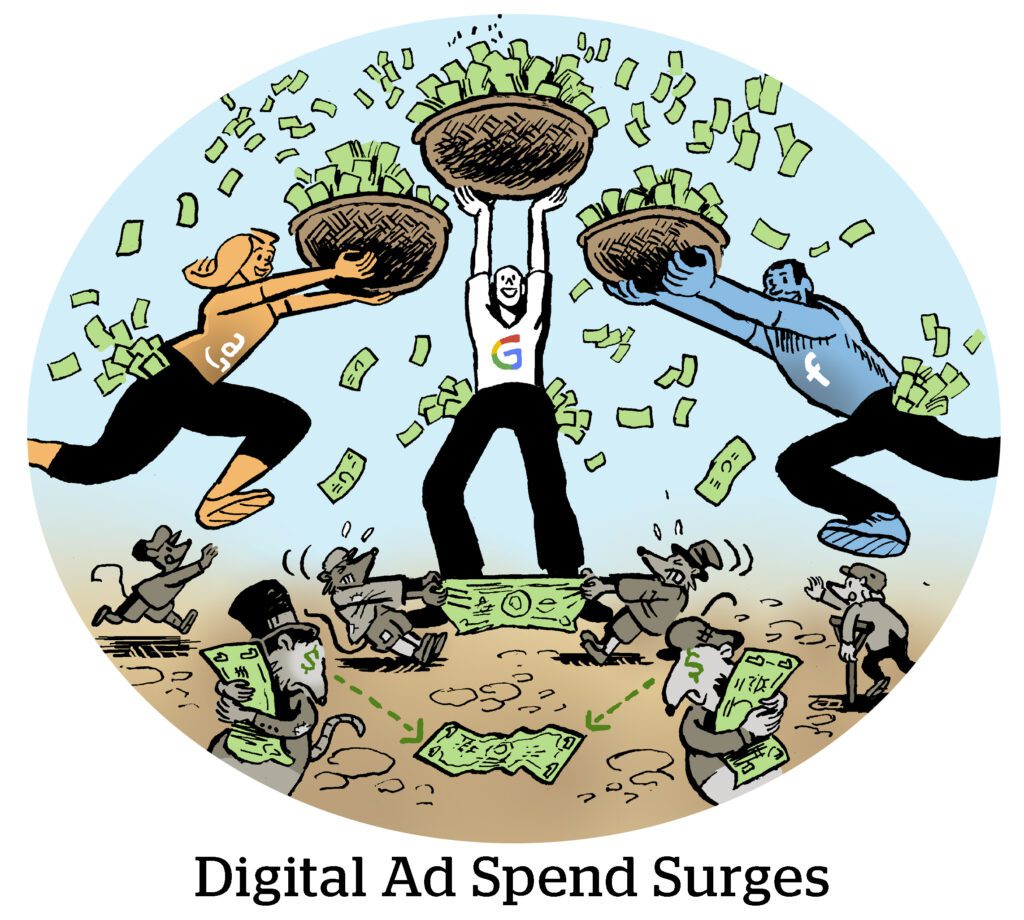Here’s today’s AdExchanger.com news round-up… Want it by email? Sign up here.
VC You On The Other Side
The food delivery app Gopuff is looking for a $300 million “cash cushion,” The Wall Street Journal reports, to help bridge tough economic times and diminishing returns in the superfast food delivery startup category.
SoftBank, a gigantic Japanese fund and preexisting Gopuff investor, is setting up a loan.
The delivery category in general and SoftBank in particular are examples of how VC dollars can lead to pyrrhic victories without lasting winners.
SoftBank didn’t just bet big on Gopuff. It went all-in on the category, backing Uber and Uber Eats, as well as food delivery startups across the globe, including Gorillas, JOKR, Swiggy and Loggi.
Diversification makes sense for SoftBank. But when companies like Gorillas, JOKR and Gopuff become flush with hundreds of millions of dollars in VC cash – and take on a growth-at-any-cost mindset – they force each other to operate unsustainably and overspend on ads and promotional deals. (A delivery service can only afford to give people $20 off their first orders for so long when they’re already underwater paying bike riders to deliver a candy bar to an apartment.)
Earlier this month, SoftBank divested its Uber holdings, and it already sold off half of its DoorDash shares last year. JOKR and Gorillas, meanwhile, both folded in their main American markets, including New York City and Boston.
Construction Sites
The site-building tech company Brandcast has been acquired by Times, the one-time Time Magazine publisher that was itself acquired four years ago by Salesforce Co-Founder and Co-CEO Marc Benioff (who’s, uhhh … also an early investor in Brandcast).
Brandcast will become a new group called Time Sites that builds sites and content for advertisers, Axios reports.
Creating quick, short-term sites has real value. People may click on a product link if they’re about to purchase, but that doesn’t happen often, and barely anyone deliberately clicks on a generic display ad.
A car brand may prefer to drive traffic to a site about road trips or electric vehicle reviews rather than place digital billboards around the web. Plus, if an advertiser owns the burner site, the company can collect first-party cookies. That’s a rare treat for brands that see next to no paid or organic traffic to their own content.
The idea isn’t new. L’Oréal piloted a site ownership plan in 2018 with pop-up media brands posing as fashion or makeup publishers on Facebook and Instagram. But it could hold more appeal as third-party cookies disappear and Apple iOS blocks the ability to track deep-linked traffic between social apps and web browsers.
The Whipping Post
The Washington Post is considering newsroom and other cuts after a drop in ad revenue, The New York Times reports.
The Post’s digital ad revenue in the first half of 2022 fell 15% YoY to $70 million, and the company is on pace to lose money this year.
In response, CEO Fred Ryan has floated cutting 100 newsroom positions through a hiring freeze or “other ways.” WaPo, for what it’s worth, claims it will not reduce its current newsroom headcount of about 1,000.
Some WaPo executives blame Ryan for not broadening the paper’s coverage, for mismanaging the brand and for not acquiring a title like The Associated Press, The Economist or The Guardian.
Donald Trump’s defeat in the 2020 election is one excuse for the Post’s struggles. Although both The New York Times and The Wall Street Journal have added subscribers since 2020, WaPo’s paid subscriber count has now fallen below the 3 million mark hit in 2020.
The Post is looking to diversify its coverage beyond politics to reach five million paid subscribers by 2025.
Related: WaPo makes not much more than scraps off of Hollywood deals inspired by its reporting. [Vanity Fair]
But Wait, There’s More!
YouTube is testing a new “Promotions” Tab. [Search Engine Land]
The pitch deck VidMob used to raise its recent $110 million Series D. [Insider]
Twitter was going to launch a subscription product to compete with OnlyFans, but scrapped it because it couldn’t effectively screen for harmful sexual content and child pornograhy. [The Verge]
Robert Kyncl is stepping down as YouTube’s chief business officer. [Variety]
New book offers an inside look at how advertising boycotts forced YouTube to crack down on extremism. [Bloomberg]














